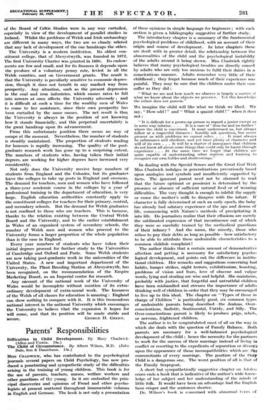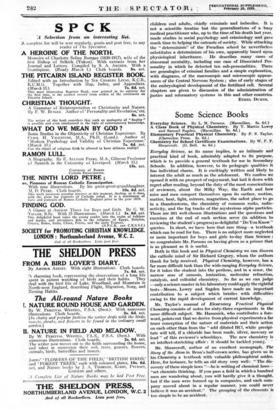Parents' Responsibilities
Difficulties in Child Development. By Mary Chadwick- (Allen and Unwin. 15s.)
The Child of Circumstance. By Albert Wilson, M.D. (John Bale, Son & Danielsson. 15s.)
Miss CHADWICK, who has contributed to the psychological journals several papers on Child Psychology, has now pro- duced a penetrating and sympathetic study of the difficulties arising in the training of young children. This book is for the use of parents, teachers, nurses, welfare workers and other guardians of the young. In it are embodied the prin- cipal discoveries and opinions of Freud and other psycho- logists at present scattered throughout innumerable volumes in English and German. The book is not only a presentation
of these opinions in simple language for beginners ; with each section is given a bibliography suggestive of further study.
The introductory chapter is a summary of the fundamental psycholOgical problems of childhood, with an account of their origin and course: of development.. In later chapters these are dealt with in greater detail, the relationship between the abnormalities of the child and the psychological instability of the adults around it being shown. Miss Chadwick rightly believes that many psychological troubles arc directly caused by adults who are only too anxious to fulfil their duties in a conscientious manner. Adults remember very little of their childhood ; they forget because much of their experience was painful. They may be sure that the children under their care suffer as they did: '
" What we see and how much we observe is largely a matter of what we know- about the objects we perceive. Yet this knowledge
the infant does not possess."
We imagine the child will like what we think we liked. We say, "How odd !" and " What a quaint child!" when it does not :
" It is difficult for a grown-up person to regard ajunior except as in some way inferior.. . . It is a case of ' thus far and no farther ' where the child is concerned. It must understand us, but always follow at a respectful distance : humbly ask questions, but never present us with problems we cannot solve. . . . It must always be submissive and obedient, and yet have plenty of character and will of its own . . . It will be a-matter of annoyance that children do not know all about some things that could only be learnt through experience . . . At the same time we forget that children are quite capable of understanding other matters and learning to recognise our own foibles and shortcomings."
In dealing with the Special Senses and the Great God Wish Miss Chadwick indulges in generalizations precariously based upon analogies and symbols and insufficiently supported by facts. The ignorant parent need not be alarmed to read that the future optimist or pessimist is determined by the presence or absence of sufficient natural food or of weaning difficulties. The very thought is enough to inhibit the supply or cause the mother's milk to disagree with the infant. If character is ftillY determined at such an early epocli, the baby has already had salutary experience of the ups and downs of life, commencing with Nature's methods of precipitating it into life. Do journalists realize that their effusions are merely the sublimated expression of that incontinence out of which they were so carefully trained by the methodical guardians of their infancy ? And the mean, the miserly, those who refuse to pay their debts as long as possible—how satisfactory to be able to attribute these undesirable characteristics to a common childish complaint !
The author thinks that a certain amount of demonstrative affection and petting is necessary for satisfactory psycho- lOgical development, and points out the difference in institu- tional children. Her remarks and suggestions concerning bad habits, hunger strikes, night terrors, exhibitionism, boasting, problems of vision and fears, love of obscene and vulgar Words, lying and stealing are wise and helpful. She maintains, probably with justice, that forgetful and untruthful children have been mishandled and stresses the importance of adults thinking well of children in order that they may be encouraged to live up to this ideal. The chapter on " Types of those in charge of Children " is particularly good, six common types of undesirable parents being described—the Jealous, Over- conscientious, Sadistic, Sentimental, Untidy, and Silly. The Over-conscientious - parent is likely to produce prigs, rebels, or nervous, frightened children.
The author is to be congratulated most of all on the way in which she deals with the question of Family Balance. Both parents are necessary for a well-balanced psychological development of the child ; hence the necessity for the partners to work for the success of their marriage instead of living in conflict or resorting to the expedients of separation or divonfa upon the appearance of those incompatibilities which arc this concomitants of every marriage. The position of the Only Child is a dangerous one. The worst position of all is that of the Family Scapegoat.
A short but sympathetically suggestive chapter on Adoles- cence ends a book that is indicative of the author's wide know- ledge of her subject and her understanding of the minds of little folk. It would have been an advantage had the English been crisper and the sentences shorter.
Dr. Wilson's honk is eancerned with abnormal types of children and adults, chiefly criminals and imbeciles. It is not a scientific treatise but the generalizations of a busy medical practitioner who, up to the time of his death last year, made studies in social psychology and criminology and gave much time to helping the outcasts of society. While attacking the " determinism" of the Freudian school he nevertheless substitutes a determinism of his own, apparently based upon physiological inheritance. He describes many cases of abnormal mentality, including one case of Dissociated Per- sonality in which he detected ten sub-personalities. There are genealogies of criminal families and a simple explanation, with diagrams, of the macroscopic and microscopic appear- ances of the Central Nervous System ; also of early stages of the embryological development of the fertilized cell. Several chapters are given to discussion of the administration of justice and reformatory systems in this and other countries.
ETHEL DUKES,



















































 Previous page
Previous page